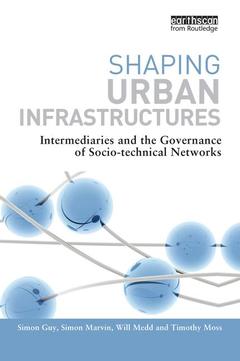Shaping Urban Infrastructures Intermediaries and the Governance of Socio-Technical Networks
Coordonnateurs : Guy Simon, Marvin Simon, Medd Will, Moss Timothy

Cities can only exist because of the highly developed systems which underlie them, ensuring that energy, clean water, etc. are moved efficiently from producer to user, and that waste is removed. The urgent need to make the way that these services are provided more environmentally, socially and economically sustainable means that these systems are in a state of transition; from centralized to decentralized energy; from passive to smart infrastructure; from toll-free to road pricing. Such transitions are widely studied in the context of the influence of service providers, users, and regulators.
Until now, however, relatively little attention has been given to the growing role of intermediaries in these systems. These consist of institutions and organizations acting in-between production and consumption, for example; NGOs who develop green energy labelling schemes in collaboration with producers and regulators to guide the user; consultants who advise businesses on how to save resources; and travel agents who match users with providers. Such intermediaries are in a position to shape the direction that technological transitions take, and ultimately the sustainability of urban networks.
This book presents the first authoritative collection of research and analysis of the intermediaries that underpin the transitions that are taking place within urban infrastructures, showing how intermediaries emerge, the role that they play in key sectors - including energy, water, waste and building - and what impact they have on the governance of urban socio-technical networks.
List of Figures and Tables
About the Contributors
Preface
1. Intermediaries and the Reconfiguration of Urban Infrastructures - An Introduction
Part I: Conceptual Framework: Governance, Transitions and Cities
Introduction
2. Intermediaries and the Governance of Urban Infrastructures in Transition
3. Systemic Intermediaries and Transition Processes
4. Cities Mediating Technological Transitions
Part II: Intermediaries in Network Transitions
Introduction
5. Constructing Markets for Green Electricity: the 'Soft Power' of Intermediaries in Transforming Energy Systems
6. An Intermediary and Policy Implementation: Translating the EU Urban Wastewater Directive
7. The Intermediation of Water Expertise in a Post-privatization Context
8. Mobility, Markets and 'Hidden' Intermediation: Aviation and Frequent Flying
Part III: Intermediaries and Scalar Transitions
Introduction
9. Strategic Intermediation: Between Regional Strategy and Local Practice
10. Re-interpreting Regulations: Architects as Intermediaries for Zero Carbon Buildings
11. Smart Meters as Obligatory Intermediaries: Re-constructing Environmental Action
12. Bridging the Recovery Gap
13. Conclusions: The Transformative Power of Intermediaries
Simon Guy is Professor and Director of Manchester Architecture Research Centre (MARC) at The University of Manchester, UK.
Simon Marvin is Professor and Co-Director at the Centre for Sustainable Urban and Regional Futures, University of Salford, UK.
Will Medd is a Lecturer in Human Geography, Lancaster Environment Centre, Lancaster University, UK.
Timothy Moss is Deputy Director at the Leibniz Institute for Regional Development and Structural Planning, Erkner, Germany.
Date de parution : 12-2015
15.6x23.4 cm
Date de parution : 12-2010
15.6x23.4 cm
Thèmes de Shaping Urban Infrastructures :
Mots-clés :
strategic; intermediaries; simon; guy; socio-technical; networks; intermediary; organizations; smart; meter; Te Ch; Secondary Flooding; Quantity Surveyors; Public Private Partnerships; Smart Meters; Socio-technical Networks; Green Electricity Market; Strategic Intermediaries; Flood Recovery; Recovery Gap; Loss Adjusters; Timothy Moss; Sustainable Water Management; Market Intermediaries; Simon Guy; Interpretive Intermediaries; Energy Efficiency; SME Network; Flood Risk Management System; UK’s Building Regulation; Green Electricity; IRBM; Flood Risk Management; UK’s Environment Agency; Systemic Intermediaries



